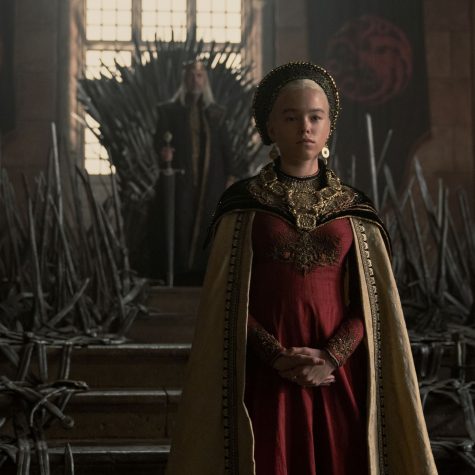House of the Dragon and the Value of Shock
 Milly Alcock as Rhaenyra, Paddy Considine as Viserys. Image: HBO Max
Milly Alcock as Rhaenyra, Paddy Considine as Viserys. Image: HBO Max
HBO’s new fantasy drama “House of the Dragon” is, so far, a perfectly fine show. Its story is deep and intriguing, a beautifully complex web of lineages and grievances and not-so-hidden motives. Its characters feel true to the varied positions they hold (or don’t hold) in a cutthroat medieval court, and the actors and actresses who play them give distinct, inspired performances. Its writing, directing, visual effects, score, and cinematography are all expert-level. Oh—and it’s a prequel to “Game of Thrones.”
I consider myself part of the average population when it comes to familiarity with “Game of Thrones.” I haven’t read the books, at least not past the first ten pages, but I have seen the show—all eight seasons of it. My irresponsible older sister got ten-year-old me into it around Season 3, probably the height of the show’s massive popularity and (at that time) universal critical acclaim. It was the season of the Red Wedding, a scene near the finale so talked-about that you might have heard of it even if you’ve never seen a single episode. I think it’s reached its status as a touchstone for “Game of Thrones” because it features, in huge doses, what the show always did best: shock value.
(SPOILERS FOR A DECADE-OLD EPISODE) At a supposed-to-be-peaceful wedding in the midst of a war, the bride’s family betrays the husband’s family, and the main hero of the show is shot to death with crossbows, his pregnant wife is stabbed multiple times in her stomach and left to bleed out, and his mother, also a main character, has her throat slit, and then it cuts to black and the credits roll. Are you gasping yet? People in 2013 were; go on YouTube and search “red wedding” and see the countless viral reaction videos of groups of friends on couches screaming and crying and basically everything short of yanking their hair out in clumps. I was one of them. I, like a good chunk of America, was held captive by a show that made you root for its downtrodden characters and immerse yourself in its fully-realized cities and kingdoms—a show that delighted in torturing and murdering those characters and burning those cities to the ground. You had to keep watching just to make sure that Jon Snow survived, or that he would come back, or that he would survive after coming back. This worked for nine years.
Then Season 8 happened. All the good faith invested in “Game of Thrones” up to that point—the idea that all this carnage must be for something, that it had to lead somewhere—was lost entirely by what is commonly considered one of the worst last seasons of television in history. The show ran out of shock. It had nowhere left to go, and the places it did go made sense by no other metric than “Wouldn’t It Be Shocking?” Wouldn’t it be shocking if (SPOILERS) Arya killed the Night King? Wouldn’t it be shocking if Daenerys turned evil, or if Bran became king? Wouldn’t it be shocking if the biggest show in the world ended with the cinematic equivalent of a wet fart?
This is the problem I have with “House of the Dragon.” It’s good, but only so far. “Game of Thrones” was great for at least four seasons before its slow, then speedy, decline. The shocks were still shocking in those early seasons. And the shocks of “House of the Dragon,” for the most part—the C-section, the Crabfeeder fight—are already gaining praise. I like them, too. I hope they matter this time.


